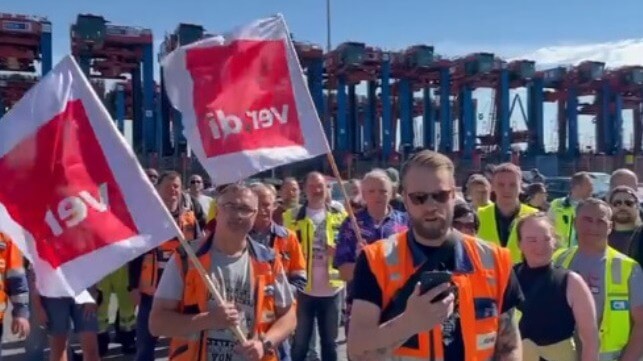German Seaports Brought to Standstill by Strikes Ahead of Wage Negotiations

Germany’s power labor union Ver.di called another round of “warning strikes” at the major container ports starting on Tuesday and continuing into Wednesday ahead of the next round of wage and contract negotiations. The union openly says its objective is to pressure terminal operators represented by ZDS (Zentralverband der deutschen Seehafenbetriebe) into a deal while calling the previous offers “inadequate” to keep up with inflation and the demands of the job.
Dockworkers staged a series of strikes during June tied to each of the three prior rounds of negotiations. Under German labor law, the union is free to call these short-duration “warning strikes” without conducting full votes of the membership each time. Negotiations began in May on the new contract for 11,500 employees at German North Sea ports.
Workers at the port of Hamburg walked off the job on Tuesday morning, July 9, at the start of the first shift of the day, and began protests in the port area. This strike is scheduled to continue through all three shifts on Wednesday with Ver.di reporting there will also be a larger protest rally on Wednesday.
The port of Bremen/Bremerhaven joined in the strike on Tuesday afternoon with its walkout scheduled to continue till the first shift on Wednesday. While Bremerhaven is due to resume work, dockworkers at the westernmost seaport of Edem are due to walk off the job for the full shift on Wednesday.
“The right to strike is enshrined in Germany's constitution,” ZDS said in response to the union announcing the strikes. “However, when exercising the right to strike, moderation and balance should be maintained. In light of the constructive rounds of negotiations to date and the fair offer presented, the ZDS believes there is currently no reason for warning strikes that would impair the reliability of German seaports.”
ZDS called the prior rounds of negotiations “intensive but constructive” saying that it remains confident that a wage agreement can be reached in the upcoming round of negotiations. While talks are scheduled for July 11 and 12, they however highlighted that terminal operators are required to invest in the transformation of the operations while also experiencing the economic consequences of the current business environment.
"In the third round of negotiations, we were still far apart," said Ver.di negotiator Maren Ulbrich. "The offer presented by the employers is not acceptable to us. The employers still have to make some progress, particularly on the wage increases offered."
Ver.di is demanding a wage increase of €3 per hour plus other concessions based on it having forgone shift allowances in the 2022 collective agreement.
The strikes began in June and have covered the operations at Hamburg, Bremen, Bremerhaven, Brake, and Edem. The Wilhelmshaven Container Terminal stopped work on June 27 in a previous effort to pressure the employers.

that matters most
Get the latest maritime news delivered to your inbox daily.
“Affected Maersk vessels at Hamburg and Bremerhaven will observe the duration of the strike and recover the impact when service resumes fully,” the carrier wrote in its latest customer advisory. Previously they had warned of the potential of port congestion and said they would consider omitting planned port calls to maintain schedules. For the carriers, the strikes come as they are already under severe schedule pressures due to the diversions away from the Red Sea routes.
Ver.di highlights that in 2022 they closed the ports for a total of 80 hours through a series of warning strikes. They said that additional strikes would depend on progress from this week’s talks but said additional strikes could be required.
